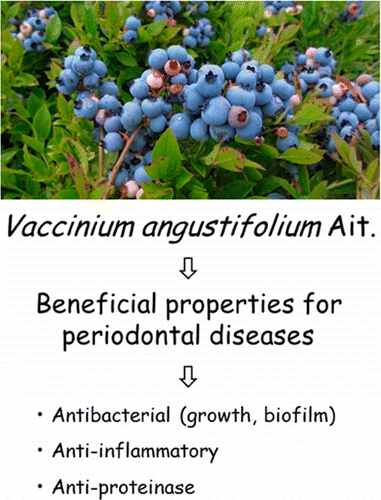Blueberry extract could help fight gum disease and reduce antibiotic use

Gum disease is a common condition among adults that occurs when bacteria form biofilms or plaques on teeth, and consequently the gums become inflamed. Some severe cases, called periodontitis, call for antibiotics. But now scientists have discovered that wild blueberry extract could help prevent dental plaque formation. Their report in ACS' Journal of Agricultural and Food Chemistry could lead to a new therapy for periodontitis and a reduced need for antibiotics.
Many people have had some degree of gum inflammation, or gingivitis, caused by dental plaque. The gums get red and swollen, and they bleed easily. If left unchecked, the condition can progress to periodontitis. The plaque hardens into tartar, and the infection can spread below the gum line and destroy the tissue supporting the teeth. To treat this condition, dentists scrape off the tartar and sometimes have to resort to conventional antibiotics. But recently, researchers have started looking at natural antibacterial compounds to treat gum disease. Daniel Grenier and colleagues wanted to see if blueberry polyphenols, which work against foodborne pathogens, could also help fight Fusobacterium nucleatum, one of the main species of bacteria associated with periodontitis.
In the lab, the researchers tested extracts from the wild lowbush blueberry, Vaccinium angustifolium Ait., against F. nucleatum. The polyphenol-rich extracts successfully inhibited the growth of F. nucleatum, as well as its ability to form biofilms. It also blocked a molecular pathway involved in inflammation, a key part of gum disease. The researchers say they're developing an oral device that could slowly release the extract after deep cleaning to help treat periodontitis.
More information: Wild Blueberry (Vaccinium angustifolium Ait.) Polyphenols Target Fusobacterium nucleatum and the Host Inflammatory Response: Potential Innovative Molecules for Treating Periodontal Diseases, J. Agric. Food Chem., 2015, 63 (31), pp 6999–7008. DOI: 10.1021/acs.jafc.5b01525
Abstract
Blueberries contain significant amounts of flavonoids to which a number of beneficial health effects in humans have been associated. The present study investigated the effect of a polyphenol-rich lowbush blueberry (Vaccinium angustifolium Ait.) extract on the two main etiologic components of periodontitis, a multifactorial disorder affecting the supporting structures of the teeth. Phenolic acids, flavonoids (flavonols, anthocyanins, flavan-3-ols), and procyanidins made up 16.6, 12.9, and 2.7% of the blueberry extract, respectively. The blueberry extract showed antibacterial activity (MIC = 1 mg/mL) against the periodontopathogenic bacterium Fusobacterium nucleatum. This property may result from the ability of blueberry polyphenols to chelate iron. Moreover, the blueberry extract at 62.5 μg/mL inhibited F. nucleatum biofilm formation by 87.5 ± 2.3%. Subsequently, the ability of the blueberry extract to inhibit the NF-κB signaling pathway in U937-3xκB cells was investigated. The blueberry extract dose-dependently inhibited the activation of NF-κB induced by F. nucleatum. In addition, a pretreatment of macrophages with the blueberry extract (62.5 μg/mL) inhibited the secretion of IL-1β, TNF-α, and IL-6 by 87.3 ± 1.3, 80.7 ± 5.6, and 28.2 ± 9.3%, respectively, following a stimulation with F. nucleatum. Similarly, the secretion of MMP-8 and MMP-9 was also dose-dependently inhibited. This dual antibacterial and anti-inflammatory action of lowbush blueberry polyphenols suggests that they may be promising candidates for novel therapeutic agents.
Journal information: Journal of Agricultural and Food Chemistry
Provided by American Chemical Society




















